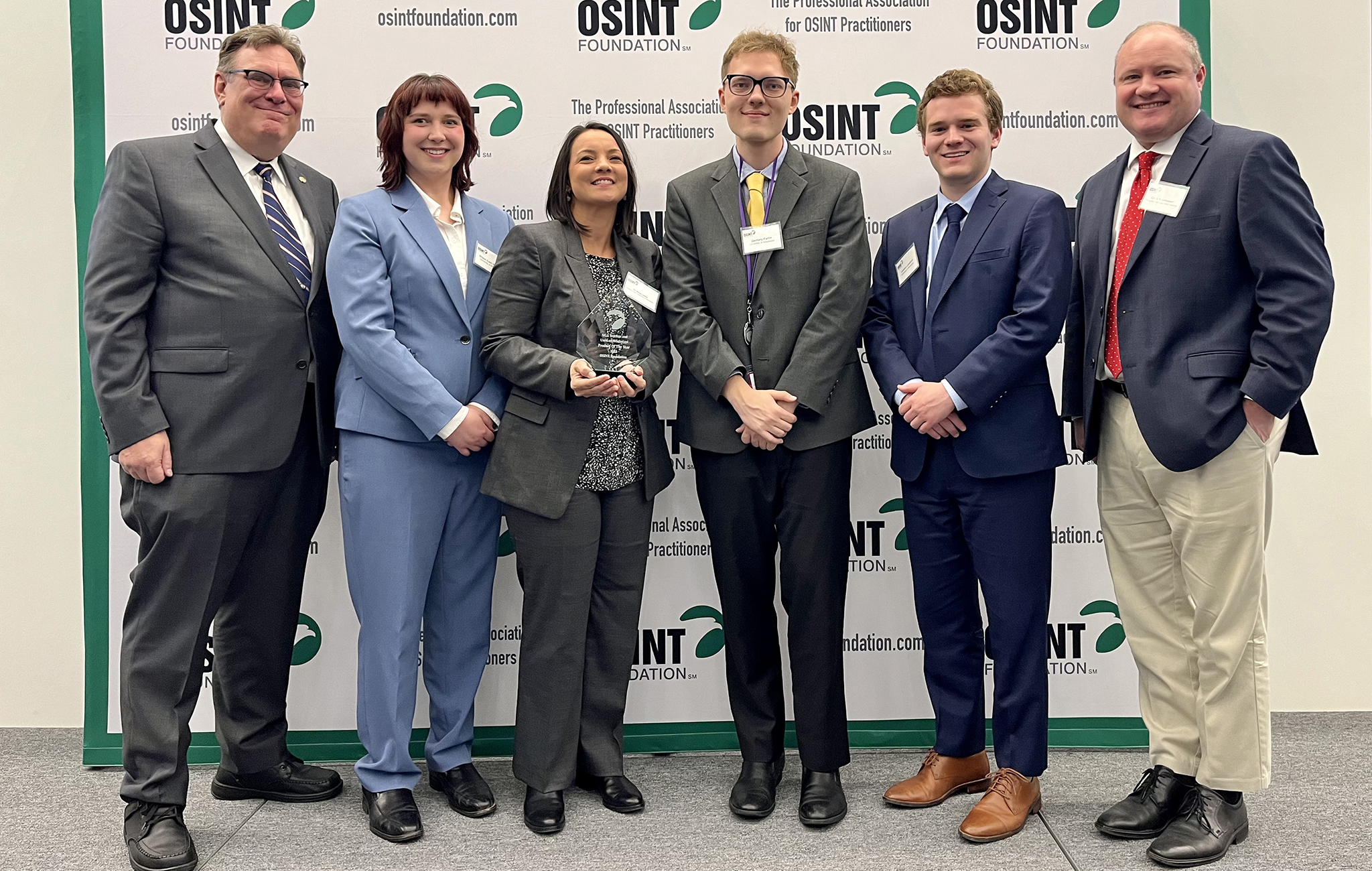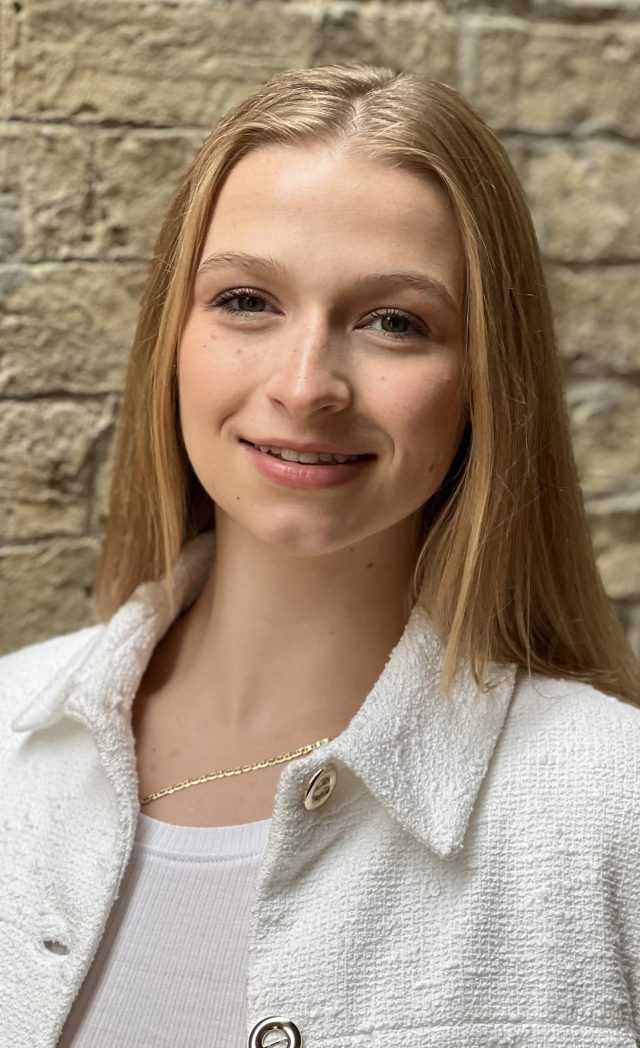Open-source intelligence foundation selects university’s security studies center for inaugural honor

David Reese (left), chair of the Practitioners Committee of the OSINT Foundation; Shaio Zerba (second from left), director of the UM Center for Intelligence and Security Studies; and Chris Rasmussen (right), Tearline Project manager for the National Geospatial-Intelligence Agency, congratulate Ole Miss students Lee Holmes (second from left), Zachary Partin (fourth from left) and Landon Lunsford for producing winning entry in this year’s NGA Tearline Project. The student team gathered and analyzed data for a report on ‘ China’s Interests in Montenegro: Alternative Analysis Case Study – Debt Traps Revisited.’ Submitted photo
NOVEMBER 6, 2023 BY CLARA TURNAGE
The OSINT Foundation has awarded its inaugural OSINT Product of the Year to a research project conducted by students in the University of Mississippi Center for Intelligence and Security Studies.
The OSINT Foundation is a national nonprofit organization devoted to promoting open-source intelligence tradecraft and developing professionals in the intelligence community. The foundation selected UM students’ publication in the National Geospatial-Intelligence Agency’s Tearline Project, “China’s Interests in Montenegro: Alternative Analysis Case Study – Debt Traps Revisited,” for an award that recognizes research that “demonstrated exceptional value to the nation,” according to the award notification.
“It’s an honor to be selected for the inaugural OSINT Product of the Year,” said Shaio Zerba, director of the Center for Intelligence and Security Studies. “I am very proud of the students and faculty who worked as a team to produce this exceptional open-source intelligence piece.”
For more than eight months, five Ole Miss students sought publicly available information regarding the Montenegrin-Chinese Belt Road and Initiative Loan agreement of 2014. The students found that although a Montenegrin default is unlikely, the result of such a lapse could include China gaining railroads, ports and other infrastructure in the Balkan country.
“The writing standards for the Tearline Project are exceptionally high,” said Chris Rasmussen, Tearline Project manager for the National Geospatial-Intelligence Agency. “This Montenegro report was especially challenging because of the fragmented nature of the state-owned asset reporting. It required an incredible attention to detail to document that these are state-backed assets.”
The NGA’s Tearline Project is an open-source intelligence platform created to expand analytic outreach with outside groups and encourage in-depth understanding of various topics for the intelligence community. Researchers writing for the Tearline Project run the gamut from undergraduate students to post-doctoral researchers and members of think tanks, Rasmussen said.
The five students, all of whom are members of the Center for Open Source Analysis, a UM student-run analysis group that works to publish open-source intelligence pieces on national security issues, approached the NGA in fall 2022 about contributing to the Tearline Project.
“They wanted to be a part of the project,” Rasmussen said. “The Montenegro case was an existing project … but it needed a qualified group of people to get it over the goal line.”

Sydney Lynch
Sydney Lynch, a senior art history and classics major from Long Island, New York, led the Montenegro Belt Road Project. She said the students never considered that their effort would win an award.
“When we worked on that project, we didn’t think we’d have our inaugural piece be product of the year,” Lynch said. “That wasn’t on our radar. We focused on creating this piece that was applicable to the world of intelligence.”
The students spent months identifying and analyzing open-source information and commercial imagery in Montenegro to determine what state assets could be subject to seizure under a breach of contract. Additionally, the group examined the financial state of Montenegro.
Senior accounting and Chinese major Zach Partin, of Collierville, Tennessee, spent most of his time on the project reviewing financial entities in Montenegro and China.
“A big reason I wanted to do it is I want to do intelligence work, and this is intelligence work,” Partin said. “It’s as close as you can get without being in an agency. That was a big appeal to me.”
Lee Holmes, a junior international studies and Arabic major from Tullahoma, Tennessee, joined the cohort of student researchers last fall as an editor.
“It made me realize there’s a lot more information out there,” Holmes said. “Writing about the Montenegro Belt Road initiative made me realize how much we don’t know and how much we still have to learn.
“There’s more affecting everything that we don’t even realize – it’s like unfurling rose petals of knowledge.”
Now that the Montenegro project has ended, the university has partnered again with the Tearline Project this fall to create a new intelligence report on climate change in the Benelux region of Europe, which includes Belgium, the Netherlands and Luxembourg. Lynch is leading the new project.
“The team is really fantastic,” she said. “Everybody is new but there’s also a lot of underclassmen that we want to train to this so that when we graduate, we have someone to pass the torch to and Ole Miss will be a continuing Tearline Project.”